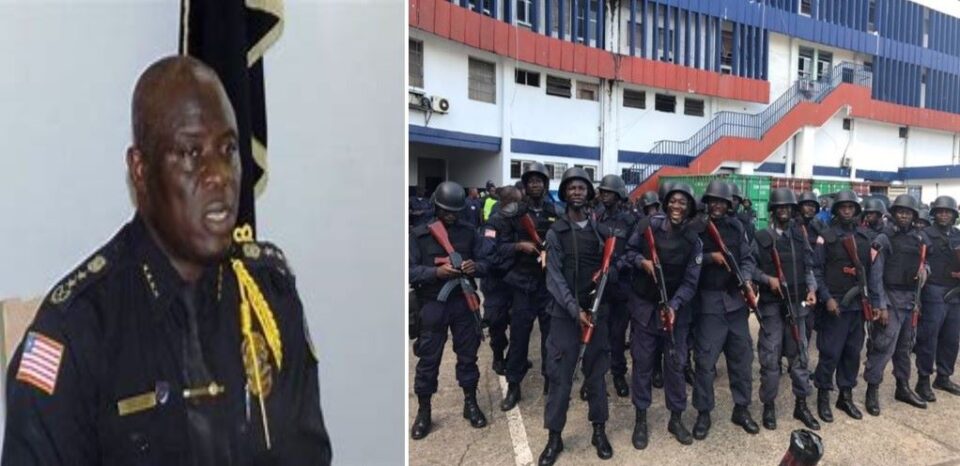PHOTO: (L-R) Police IG Patrick Sudue and LNP officers
The Afrobarometer has released its new study on Liberia saying, “Survey findings show that a majority of Liberians think most police officers are corrupt.”
According to the survey, which was published on April 18, 2023, “among citizens who encountered the police during the previous year, a majority say it was difficult to obtain assistance, and more than three-fourths say they had to pay a bribe.”
It adds: “Many also complain of unprofessional conduct, saying the police often use excessive force, stop drivers without good reason, engage in criminal activities, and fail to respect citizens’ rights.”
The Afrobarometer team in Liberia, led by the Center for Democratic Governance, interviewed a nationally representative, random, stratified probability sample of 1,200 adult Liberians between 15 August and 7 September 2022.
The report says a sample of this size yields country-level results with a margin of error of +/-3 percentage points at a 95% confidence level. Previous surveys were conducted in Liberia in 2008, 2012, 2015, 2018, and 2020.
In its executive summary, the report said that after a civil war (1999-2003) in which it was factionalised and out of control, the Liberia National Police (LNP) was disbanded, then re-created with the support of the United Nations Mission in Liberia (UNMIL), which assumed primary responsibility for internal peace and security for more than a decade (Centre for Public Impact, 2016; Human Rights Watch, 2013).
The latest Afrobarometer report also speaks of “a growing number of Liberians report experiencing insecurity in their neighbourhoods and homes, and most say the government is doing a poor job of reducing crime.”
One of the findings shows, “Two-thirds (66%) of citizens say that “most” or “all” police are corrupt – the worst rating among 12 institutions and leaders the survey asked about.”
Below are the complete findings:
Key findings
- About six in 10 citizens say they felt unsafe while walking in their neighbourhood (62%) and feared crime in their home (59%) at least once during the previous year. Experiences of insecurity have increased sharply over the past two years. Poor citizens are more than twice as likely to feel unsafe and to fear crime as their well-off counterparts.
- Two in 10 respondents (20%) say they requested police assistance during the previous year. Three times as many (63%) say they encountered the police in other situations, such as at checkpoints, during identity checks or traffic stops, or during an investigation.
- Among citizens who asked for help from the police, 55% say it was difficult to get the assistance they needed, and 78% say they had to pay a bribe.
- Among those who encountered the police in other situations, 70% say they had to pay a bribe to avoid problems.
- Two-thirds (66%) of citizens say that “most” or “all” police are corrupt – the worst rating among 12 institutions and leaders the survey asked about.
- Only one-fourth (26%) of Liberians say they trust the police “somewhat” or “a lot.” Substantial proportions of the population say the police “often” or “always” stop drivers without good reason (53%), use excessive force during protests (39%) and with suspected criminals (38%), and engage in criminal activities themselves (35%).
- But three-fourths (74%) consider it likely that the police will take reports of genderbased violence seriously.
- Only 20% of citizens say the police “often” or “always” operate in a professional manner and respect all citizens’ rights.
- Only 18% of Liberians approve of the government’s performance on reducing crime, down 39 percentage points over the past decade.

